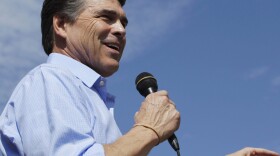NASHUA, N.H. — Gov. Rick Perry sent the media into a feeding frenzy this week when he went hammer and tong after the U.S. Federal Reserve, but supporters of another Texan running for the White House heard something familiar: the message of Ron Paul.
“We agree with him, but let’s point out that he’s parroting what Ron Paul has been saying for years,” said Debra Medina, a Ron Paul acolyte who ran an unsuccessful gubernatorial campaign against Perry in 2010. “He’s reading the economy and the monetary policy concerns and he’s mimicking Ron Paul.”
Perry’s sustained attack on the central bank has helped nourish a widespread feeling among Paul supporters that the Republican congressman can’t catch a break. He’s been bashing the Fed for years, and here comes Perry stealing all the thunder.
Paul, who ran a new ad this week criticizing Perry and other "smooth-talking" politicians, was opening his campaign headquarters Wednesday evening about 15 miles from where the Texas governor spoke to a bipartisan breakfast gathering. Perry had the kind of national media entourage in tow that Paul has never drawn, much to the consternation of Paul's supporters, who accuse the media of ignoring their candidate.
Perry set off a firestorm when he said it would be “almost treasonous” for the Federal Reserve chairman to print more money to help prop up the economy before the 2012 election. He has since toned down the heated rhetoric, but Perry has been more than happy to keep the focus on the issue.
At the breakfast on Wednesday, he joked that he had gotten “in trouble” for talking about the Fed, but he used the occasion to pile more criticism on it. He called for an audit of the Federal Reserve and said it would show whether or not there had been any “improper” behavior.
On Tuesday, Paul suggested the governor's Fed attack was politically motivated.
“I think politically he’s pretty astute. He came out for secession, too, when he had a Tea Party candidate running against him,” Paul said of Perry on CNBC's The Kudlow Report. “I have no idea what his real principles are.”
He noted that he's long been a foe of the Fed. “I was motivated in the 1970s, because the handwriting was on the wall,” he said on the cable business news channel.
Like Paul, Perry is tapping into a sea of mistrust and discontent about the central bank and the falling value of the U.S. dollar. But the governor stops well short of Paul, who wants to abolish the Federal Reserve and return to the gold standard and an exclusively private banking system. During the debt ceiling drama in Washington, with the possibility that the U.S. might default on its obligations, Paul proposed stiffing the Federal Reserve.
"We owe, like, $1.6 trillion because the Federal Reserve bought that debt, so we have to work hard to pay the interest to the Federal Reserve," Paul told CNN Money at the end of June. "We don't, I mean, they're nobody; why do we have to pay them off?" The website noted that the Fed turns over the interested earned to the federal government, including $79 billion returned to the Treasury in 2010.
Jim Henson, who directs the Texas Politics Project in the Department of Government at the University of Texas, compared the controversy over the Fed to Perry’s sensational 2009 comments about the possibility that Texas might secede from the U.S.: The media and many mainstream voters tend to lose their minds, but Perry scores with an influential group of Republicans key to his party’s nomination.
“I think it’s another one of these issues where he found something that he’ll get criticized about from the outside but will be golden with in his base,” said Henson, who is also co-director of the University of Texas/Texas Tribune poll with Daron Shaw. “It’s almost like a little glimpse of the old Rick Perry. I think it helps him.”



